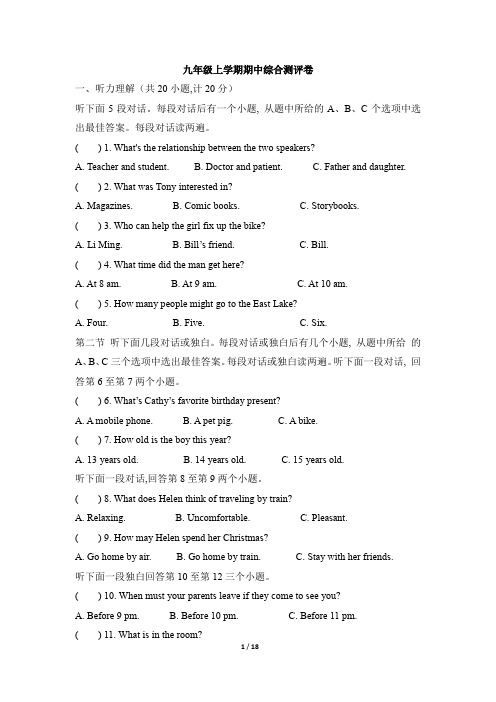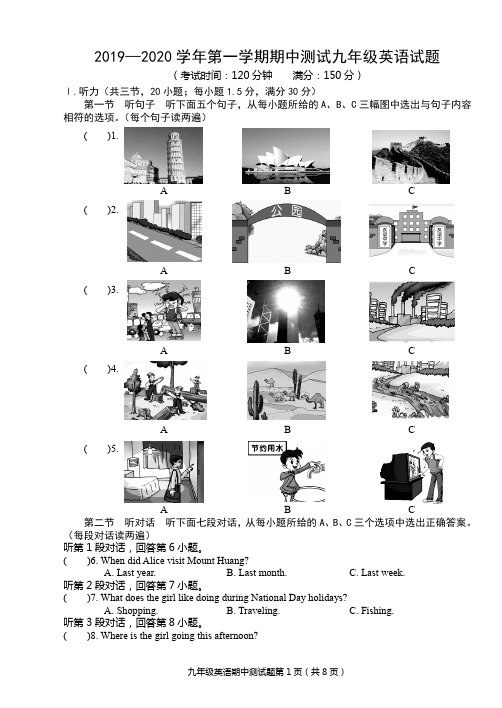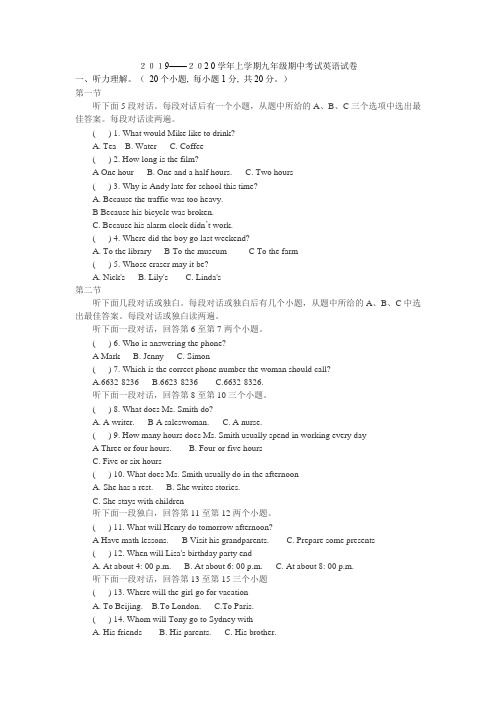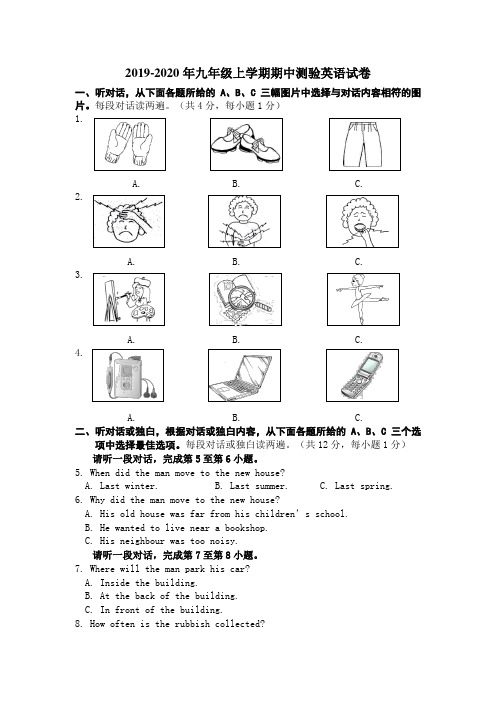陕西省西安市第二十六中学2019——2020学年九年级上学期期中英语试卷
2019-2020学年度九年级英语上学期期中测试卷及答案

九年级上学期期中综合测评卷一、听力理解(共20小题,计20分)听下面5段对话。
每段对话后有一个小题, 从题中所给的A、B、C个选项中选出最佳答案。
每段对话读两遍。
( ) 1. What's the relationship between the two speakers?A. Teacher and student.B. Doctor and patient.C. Father and daughter. ( ) 2. What was Tony interested in?A. Magazines.B. Comic books.C. Storybooks.( ) 3. Who can help the girl fix up the bike?A. Li Ming.B. Bill’s friend.C. Bill.( ) 4. What time did the man get here?A. At 8 am.B. At 9 am.C. At 10 am.( ) 5. How many people might go to the East Lake?A. Four.B. Five.C. Six.第二节听下面几段对话或独白。
每段对话或独白后有几个小题, 从题中所给的A、B、C三个选项中选出最佳答案。
每段对话或独白读两遍。
听下面一段对话, 回答第6至第7两个小题。
( ) 6. What’s Cathy’s favorite birthday present?A. A mobile phone.B. A pet pig.C. A bike.( ) 7. How old is the boy this year?A. 13 years old.B. 14 years old.C. 15 years old.听下面一段对话,回答第8至第9两个小题。
( ) 8. What does Helen think of traveling by train?A. Relaxing.B. Uncomfortable.C. Pleasant.( ) 9. How may Helen spend her Christmas?A. Go home by air.B. Go home by train.C. Stay with her friends.听下面一段独白回答第10至第12三个小题。
2019-2020学年第一学期期中测试九年级英语试题【含答案】

九年级英语期中测试题第1页(共8页)2019—2020学年第一学期期中测试九年级英语试题(考试时间:120分钟 满分:150分)Ⅰ.听力(共三节,20小题;每小题1.5分,满分30分)第一节 听句子 听下面五个句子,从每小题所给的A 、B 、C 三幅图中选出与句子内容相符的选项。
(每个句子读两遍)( )1.A B C( )2.A B C( )3.A B C( )4.A B C( )5.A B C第二节 听对话 听下面七段对话,从每小题所给的A 、B 、C 三个选项中选出正确答案。
(每段对话读两遍)听第1段对话,回答第6小题。
( )6. When did Alice visit Mount Huang?A. Last year.B. Last month.C. Last week. 听第2段对话,回答第7小题。
( )7. What does the girl like doing during National Day holidays?A. Shopping.B. Traveling.C. Fishing. 听第3段对话,回答第8小题。
()8. Where is the girl going this afternoon?A. A school library.B. A post office.C. A clothes shop.听第4段对话,回答第9小题。
( )9. Why couldn’t the boy sleep?A. Because noise pollution.B. Because air pollution.C. Because light pollution. 听第5段对话,回答第10、11小题。
( )10. How long did it take Miss Kumar to fly to China?A. Twelve hours.B. Eleven hours.C. Ten hours.( )11. Where will Miss Kumar visit in China?A. Some schools.B. Some places of interest.C. Some factories.听第6段对话,回答第12、13小题。
2019-2020学年度九年级上英语期中试卷(普通班)含答案

九年级上英语期中试卷(普通班)(时间:90分钟;分数:100分)卷首语:同学们,经过近半个学期的努力学习,你一定进步了吧!今天,一起完成这次的英语试卷!看看自己在哪些方面做得还真不错,以便继续发扬;哪些方面存在不足,需要在今后的学习中注意。
每个人的成功都要经历无数次历练,无论成功还是失败对我们都十分重要。
Good luck to you !一、听力部分(本大题有15小题,每小题1分,共15分)A.听句子(每小题1分,共5分)根据所听句子的内容和所提的问题,选择符合题意的图画回答问题。
每小题听一遍。
()1.What is the speaker doing now?A.B. C.()2.Why was Tom tired?A.B. C.()3.What does the speaker think is good for health?A.B. C.()4.What did the girl's father use to do?A.B. C.()5.What should we do twice every day?A.B. C.B.听下面三段对话,回答问题,每段短文读一遍(每小题1分,共5分)听第一段对话,回答第6小题。
()6.What do we know about the woman's old house?A.Big and quiet. B.Small and quiet. C.Big and noisy.听第二段对话,回答第7—8小题。
()7.What does Mr.White often do after supper?A.He goes for a walk. B.He watches TV. C.He listens to music.()8.What doesn't Mr.White eat for supper?A.Vegetables. B.Meat. C.Fish.听第三段对话,回答第9—10小题。
九年级期中考试英语试卷

2019——202 0学年上学期九年级期中考试英语试卷一、听力理解。
(20个小题, 每小题1分, 共20分。
)第一节听下面5段对话。
每段对话后有一个小题,从题中所给的A、B、C三个选项中选出最佳答案。
每段对话读两遍。
( ) 1. What would Mike like to drink?A. TeaB. WaterC. Coffee( ) 2. How long is the film?A One hour B. One and a half hours. C. Two hours( ) 3. Why is Andy late for school this time?A. Because the traffic was too heavy.B Because his bicycle was broken.C. Because his alarm clock didn’t work.( ) 4. Where did the boy go last weekend?A. To the library B To the museum C To the farm( ) 5. Whose eraser may it be?A. Nick'sB. Lily'sC. Linda's第二节听下面几段对话或独白。
每段对话或独白后有几个小题,从题中所给的A、B、C中选出最佳答案。
每段对话或独白读两遍。
听下面一段对话,回答第6至第7两个小题。
( ) 6. Who is answering the phone?A Mark B. Jenny C. Simon( ) 7. Which is the correct phone number the woman should call?A.6632-8236B.6623-8236C.6632-8326.听下面一段对话,回答第8至第10三个小题。
( ) 8. What does Ms. Smith do?A. A writer. B A saleswoman. C. A nurse.( ) 9. How many hours does Ms. Smith usually spend in working every dayA Three or four hours. B. Four or five hoursC. Five or six hours( ) 10. What does Ms. Smith usually do in the afternoonA. She has a rest.B. She writes stories.C. She stays with children听下面一段独白,回答第11至第12两个小题。
2019-2020年九年级上学期期中测验英语试卷

2019-2020年九年级上学期期中测验英语试卷一、听对话,从下面各题所给的A、B、C三幅图片中选择与对话内容相符的图片。
每段对话读两遍。
(共4分,每小题1分)1.A. B. C.2.A. B. C.3.A. B. C.A. B. C.二、听对话或独白,根据对话或独白内容,从下面各题所给的A、B、C三个选项中选择最佳选项。
每段对话或独白读两遍。
(共12分,每小题1分)请听一段对话,完成第5至第6小题。
5. When did the man move to the new house?A. Last winter.B. Last summer.C. Last spring.6. Why did the man move to the new house?A. His old house was far from his chi ldren’s school.B. He wanted to live near a bookshop.C. His neighbour was too noisy.请听一段对话,完成第7至第8小题。
7. Where will the man park his car?A. Inside the building.B. At the back of the building.C. In front of the building.8. How often is the rubbish collected?A. Once a week.B. Twice a week.C. Every day.请听一段对话,完成第9至第11小题。
9. What does the woman want to do?A. Have a short tour in London.B. Go to the Hyde Park Hotel.C. Find the way to the British Museum.10. When can the woman visit London Tower?A. In the morning.B. Right after lunch.C. In the afternoon.11. How much may the woman’s family spend?A. 15 pounds.B. 30 pounds.C. 45 pounds.请听一段对话,完成第12至第13小题。
2019-2020学年西安市第二十六中学高三英语上学期期中试卷及答案

2019-2020学年西安市第二十六中学高三英语上学期期中试卷及答案第一部分阅读(共两节,满分40分)第一节(共15小题;每小题2分,满分30分)阅读下列短文,从每题所给的A、B、C、D四个选项中选出最佳选项AOne day when I was 5, my mother blamed me for not finishing my rice and I got angry. I wanted to play outside and not to be made to finish eating my old rice. When angrily opening the screen door (纱门) with my foot, I kicked back about a 12-inch part of the lower left hand corner of the new screen door. But I had no regret, for I was happy to be playing in the backyard with my toys.Today, I know if my child had done what I did, I would have blamed my child, and told him about how expensive this new screen door was, and I would have delivered a spanking (打屁股) for it. However, my parents never said a word. They left the corner of the screen door pushed out, creating an opening, in the defense against unwanted insects.For years, every time I saw that corner of the screen, it would constantly make me think about my mistake. For years, I knew that everyone in my family would see that hole and remember who did it. For years, every time I saw a fly buzzing (嗡嗡) in the kitchen, I would wonder if it came in through the hole that I had created with my angry foot. Iwould wonder if my family members were thinking the same thing, silently blaming me every time a flying insect entered our home, making life more terrible for us all. My parents taught me a valuable lesson, one that a spanking or stern (严厉的) words perhapscould not deliver. Their silent punishment for what I had done delivered a hundred stern messages to me. Above all, it has helped me become a more patient person and not burst out so easily.1. When the author damaged the door, his parents _______.A. gave him a spankingB. left the door unrepairedC. told him how expensive it wasD. blamed him for what he had done2. The experience may cause the author _______.A. not to go against his parents’ willB. to have a better control of himselfC. not to make mistakes in the futureD. to hide his anger away from others3. What is the main idea of this text?A. Parents is the best way to solve problems.B. Parents are the best teachers of their children.C. Adults should ignore their children’s bad behavior.D. Silent punishment may have a better effect on educating people.BIt all happened one afternoon in Carl's backyard a few years ago. We had just finished playing stickball, and I was about to go home.“Wait a minute,” Carl yelled. He ran into his house and cameback with a book for me to take home and read. All he said was, “See if you like it.”I said ly nothing. I kept the book for a couple of weeks and then returned it unread. Carl never asked me if I liked it or not. During the following two years Carl lent me three more books. Each time I returned them unread.A few days after graduating from high school, Carl asked, “Benny, which college are you going to?”“I'm not going to college.” I said.“Why not?” he asked.“Because my father can't afford the tuition (学费).” I answered.“Is that it?” Carl asked. “Yes,” I said.I lied. I had no intention of going back to school now that I was out. The following day, Carl knocked on my door and handed me a check for seventy-five dollars from his father along with the bookMartin Eden.“I think that should do it.” he said.Once again I was in shock. I was working full-time in my brother's bakery. I attended two classes atWayneUniversitypart-time at night. Halfway through the semester, after receiving failing grades on exams and essays, I decided there was no way I would ever become a good student and get satisfactory grades. I dropped out of college.One day, curious, I picked up the book, thinking Carl was trying to tell me something. Despite difficulty, I pressed on. By the time I finished the book, I understood why: the main character, Martin Eden, had my own poor educational background, but managed to educate himself and become a published author.4. What do we know about the author?A. He often told lies.B. He quit school unwillingly.C. He had thought little of education before.D. He became a published author.5. What kind of person is Carl?A. Caring.B. Emotional.C. Stubborn.D. Cautious.6. What message does Carl want to convey?A. Reading makes a rich man.B. Reading is the journey of the soul.C. Reading makes a person better known.D.Readingopens up new opportunities.7. What is the best title for the text?A. A strong desire for collegeB. A wish for better educationC. A wise friendD. A wise bookCIf you ever get the impression that your dog can "tell" whether you look delighted or annoyed, you may be onto something. Dogs may indeed be able to distinguish between happy and angry human faces, according to a new studyResearchers trained a group of 11 dogs to distinguish between images(图像)of the same person making either a happy or an angry face. During the training stage, each dog was shown only the upper half or the lower half of the person's face. The researchers then tested the dogs' ability to distinguish between human facial expressions by showing them the other half of the person's face on images totally different from the ones used in training. The researchers found that the dogs were able to pick the angry or happy face by touching a picture of it with their noses more often than one would expect by random chance.The study showed the animals had figured out how to apply what they learned about human faces during training to new faces in the testing stage. "We can rule out that the dogs simply distinguish between the pictures based on a simple cue, such as the sight of teeth," said study author Corsin Muller. "Instead, our results suggest that the successful dogs realized that a smiling mouth means the same thing as smiling eyes, and the same rule applies to an angry mouth having the same meaning as angry eyes.""With our study, we think we can now confidently conclude that at least some dogs can distinguish human facial expressions," Muller toldLive Science.At this point, it is not clear why dogs seem to be equipped with the ability to recognize different facial expressions in humans. "To us, the most likely explanation appears to be that the basis lies in their living with humans, which gives them a lot of exposure to human facial expressions and this exposure has provided themwith many chances to learn to distinguish between them." Muller said.8. The new study focused on whether dogs can_________.A. distinguish shapesB. make sense of human facesC. feel happy or angryD. communicate with each other9. What can we learn about the study from paragraph 2?A. Researchers tested the dogs in random order.B. Diverse methods were adopted during training.C. Pictures used in the two stages were differentD. The dogs were photographed before the lest.10. What is the last paragraph mainly about?A. A suggestion for future studies.B. A possible reason for the study findings.C. A major limitation of the studyD. An explanation of the research method.11. In which section is the text most likely to be found in a newspaper ?A. EntertainmentB. EconomyC. ScienceD. NatureDThere is an old army joke about an officer who asks some soldiers whether any of them are interested in music. When four hands go up, the officer says, “Right, men. You can carry this grand piano down to the officers mess.”Job recruitment has become more complicated since that story first did the rounds. Today's careers require a lot more than just raw music but that sometimes makes jobs hard to define. An unfortunate result is a form of “adjective inflation” in recruitment ads as employers attempt to make routine tasks sound exciting.Candidates must sometimes wonder whether they are applying for a 9-to-5-role or to become a member of the Marvel “Avengers”. On Indeed, a job-bunting website, a bar was recently looking for "bartenders who are people focused, quality-driven, and have superhero hospitality powers". The ability to give customers the correct change was not mentioned.Another British company advertised for “a call-centre ninja, a superhero in people", a Job description which sounds a little over-the top for what was in fact a role at an insurance company in Isleworth. In case you think thatad was not typical. Indeed also had jobs demanding “ninja-like attention to detail". Short of turning up for the interview dressed head-to-toe in black, and then sneaking up behind the managing director at his desk, it is hard to see how candidates could show their ninja qualities.Not all companies require candidates to possess the qualities of a ninja, of course. Some require applicants to be passionate. The Bluewater shopping mall in southeastEnglandwas looking for “passionate sales-driven brand ambassadors” while “passionate crew members” were needed at a bakery in westLondonfor a wage of just £8. 23 an hour. In fact, passion is pretty hard to keep consistently for 40 hours a week, month after month. Job applicants should find some information from the kind of ads that companies place. If a job ad talks about passion or superheroes, run away faster than a speeding Batmobile. Being a ninja should be reserved for teenage mutant ninja turtles.12. Why does the author mention the joke in Paragraph 1?A. To show that officers enjoy playing tricks on soldiers.B. To introduce the topic of overstated job ads.C. To explain the origin of complex job ads.D. To describe soldiers' everyday life.13. Which of the following offers a job demanding ninja qualities?A. The bar.B. The bakery.C. The insurance company.D. The Bluewater shopping mall.14. What does the author say about the ads requiring passion?A. They are unrealistic.B. They are typical of want ads.C. They are appealing to applicants.D. They are uncommon on Indeed.15. How does the author sound when talking about today’s job ads?A. Curious.B. Hesitant.C. Humorous.D. Sympathetic.第二节(共5小题;每小题2分,满分10分)阅读下面短文,从短文后的选项中选出可以填入空白处的最佳选项。
2019-2020年九年级英语上学期期中试题

2019-2020年九年级英语上学期期中试题一、听力(20分)第一部分听对话回答问题(计10分)本部分共有10道小题,每小题你将听到一段对话,每段对话听两遍。
在听每段对话前,你将有5秒钟的时间阅读题目;听完后,你还有5秒钟的时间选择你认为最合适的备选答案。
1. What is the boy’s star sign?A. B. C.2. What is Nick like?A. B. C.3. What will the weather be like tomorrow?A. B. C.4. What is the man wearing?A. B. C.5. What is Li Ping’s star sign?A. Pisces.B. Aries.C. Taurus.6. What was the girl’s sister doing yesterday afternoon?A. Watching TV.B. Doing the homework.C. Doing the housework.7. Why does the woman come to the man’s flat?A. To ask for help.B. To visit her friend.C. To say “hello”8. What does the man think of the colour green?A. It can make people feel tired.B. It can help the girl with the work.C. It can bring the girl energy.9. Why didn’t the man go to the park?A. Because the park is farther than the zoo.B. Because there are too many people in the park.C. Because the park is not very interesting.10. What does Mary like most?A. Reading books.B. Listening to music.C. Watching TV.第二部分听对话和短文回答问题(计10分)你将听到两段对话和一篇短文,各听两遍。
2019-2020学年九年级英语上学期期中考试试题(I)

2019-2020 学年九年级英语上学期期中考试一试题 (I)一、听力(每题 1 分,满分20 分)第一部分听对话回答以下问题。
( ) 1. What does Tommy borrow from the girl?A. B.( ) 2. What can we find in the photo?A. B.( ) 3. What is Paul’s hobby?A. B. ( ) 4. What is the man doing now?A. B.C.C.C.C.( ) 5. What’s the date today?A. 2nd April.B. 12th April.C. 22nd April.( ) 6. What does the man think of Lucy’s brother?A. He is not fair.B. He is friendly.C. He is impolite.( ) 7. How many people will go to the boy’s birthday party?A. One.B. Fifteen.C. Twenty.( ) 8. What shop did the speakers go into?A. The flower shop.B. The sports shop.C. The shoe shop.( ) 9. What does the boy want to be?A. A scientist.B. A basketball player.C. A musician.( ) 10. Why doesn’t George eat the chocolate cak e?A. Because he doesn ’t like it.B. Because the cake is not big enough for twopeople.C. Because he has a toothache.第二部分听对话和短文回答以下问题。
- 1、下载文档前请自行甄别文档内容的完整性,平台不提供额外的编辑、内容补充、找答案等附加服务。
- 2、"仅部分预览"的文档,不可在线预览部分如存在完整性等问题,可反馈申请退款(可完整预览的文档不适用该条件!)。
- 3、如文档侵犯您的权益,请联系客服反馈,我们会尽快为您处理(人工客服工作时间:9:00-18:30)。
人教版2019-2020度第一学期期中素质测评九年级英语试题卷听力部分Ⅰ、听对话,选答案。
(共5题,计15分)第一节:听下面10段对话,每段对话后有一个问题,读两遍,请根据每段对话的内容和后面的问题,从所给的三个选项中选出最恰当的一项。
请将正确答案的序号填在题前的答题栏中。
(共10题,计10分)1. A. To a bookstore B. To a library C. To a bank2. A. Lisa B. Lisa’s mother C. Lisa’s aunt3. A. No.115 Hill Street B. No.115 King Street C. No.155 Garden Street4. A. Snakes B. Dogs C. Cats5. A. It’s June 1st. B. It’s September 10th. C. It’s January 1st.6. A. Clean the home B. Cook the dinner C. Buy a coat.7. A. She has a short hair B. She has long hair C. She is short8. A. About five kilometers B. About twelve kilometersC. About fifteen kilometers9. A. Teach children English B. Go to a concert C. Watch an English movie10. A. In Beijing B. In Tianjin C. In Shanghai第二节:听下面两段对话,请根据每段对话的内容和后面的问题,从所给的三个选项中选出最恰当的一项。
每段对话读两遍,请将正确答案的序号填在题前的答题栏中。
(共5题,计5分)听第11段对话。
回答11、12小题。
11. Who bought Ann the coat?A. Her fatherB. Her motherC. Her sister12. What’s the coat made of?A. CottonB. SilkC. Paper听第12段对话。
回答13-15小题。
13. What does Mary like doing?A. CookingB. Playing footballC. Eating candy14. How did Mary use to go to school?A. On footB. By bikeC. By bus15. What can we get from the conversation?A. Peter used to walk to school.B. Mary rides a bike to school every day now.C. Peter didn’t use to ride a bike.Ⅱ. 听短文,选答案。
(共5题,计10分)本题你将听到一篇短文,读两遍,请从每小题的三个选项中,选出最恰当的一项。
请将正确答案的序号填在题前的答题栏中。
16. What was Li Hong like before?A. ShyB. SeriousC. Careless17. What was Li Hong afraid to do in the English classes?A. Read texts aloudB. Answer questionC. Do exercises18. Li Hong learned English ______ in her free time.A. by reading English storiesB. by listening to English songsC. by going to the English corner19. What does Li Hong hope to do?A. She hopes to teach English.B. She hopes to travel abroad.C. She hopes to study abroad.20. According to the speaker, we can know ______.A. Li Hong did well in English four years agoB. Li Hong began to show interest in English after going to middle school.C. Li Hong is poor at English at the age of 16.笔试部分Ⅲ. 完型填空。
(共20题,计20分)第一节:阅读下面一篇短文,按照句子结构的语法性和上下文连贯的要求,从各小题的四个选项中选出一个最佳答案,使短文连贯完整。
(共10题,计10分)When I was a little child, I felt unhappy. I was really different from other kids. I couldn’t change no matter what 21.______.There was something wrong with my eyes. I couldn’t see things around me 22.______. When my classmates played games happily outside, I 23. ______ stay at home and looked out of the window alone.For a long time, I felt hopeless. 24. ______ my mother always said, “You are the precious(珍贵的)baby in our family .” it didn’t work.I asked God. “Why did you give me a pair of useless eyes when you gave me life?” Of course, there was no reply.I turned to books 25.______ help. Books are my best friends. When I was sad and upset, they cheered me up; when I felt happy and excited, they shared my 26.______. They could 27.______ me to another world, there I could learn a lot and enjoy myself.I began to write down my thoughts and keep them as 28.______ secret. And nobody knew it. When I studied at a middle school, I had a good teacher. He read all of my poems and said, “Well done!” He always 29.______ me in class. He kept helping me. Now I am full of energy and confidence. I can do things like other kids. So please believe in 30.______. Everyone is unique(独一无二的).21. A. I do B. do I C. I did D. did I22. A. clear B. clearly C. careful D. carefully23. A. should B. might C. could D. had to24. A. If B. Because C. Unless D. Although25. A. for B. with C. to D. about26. A. feeling B. feelings C. thank D. thanks27. A. bring B. be taken C. take D. be brought28. A. some B. / C. an D. a29. A. praises B. punish C. praised D. punished30. A. me B. you C. yourself D. myself第二节:阅读下面一篇短文,理解大意,然后从各小题的四个选项中选出一个最佳答案,使短文连贯完整。
请将正确答案的序号填在题前的答题栏中。
(共10,计10分)Every April, there is a special day in China. It is called Qingming Festival, alsocalled Tomb-Sweeping Day. On that day, people 31.______ and honor their ancestors(祖先).Qingming is a(n) 32.______ Chinese festival. It has a long history. It began over 2,000 years ago. A famous poem 33.______ the Tang Dynasty poet Du Mu describes the day: “Rains fall heavily as Qingming comes, and passers-by with lowered sprits go.”Tomb-Sweeping Day has been a public 34.______ on the Chinese mainland(中国大陆) since 2008. On this way, 35.______ bring flowers, food and wine to their ancestors’ tombs. They put food like cakes and fruits in front of the tombs. After that, they 36.______ the dirt off the tombs and remember their dead family members.37.______ do Chinese people do this? That’s because people think that visiting tombs is to 38.______ respect to their dead family members.However, Tomb-Sweeping Day is not only about this. During that time, the weather is becoming 39.______. People are also able to garden and enjoy outdoor activities. Families often 40.______ for outgoings or fly kites at this time.31. A. remember B. meet C. see D. find32. A. popular B. famous C. traditional D. unhappy33. A. for B. by C. with D. as34. A. weekend B. weekday C. journey D. holiday35. A. classes B. families C. friends D. groups36. A. turn B. keep C. sweep D. go37. A. Why B. When C. Where D. Who38. A. bring B. show C. make D. take39. A. warmer B. colder C. cooler D. shorter40. A. have fun B. work hard C. pull together D. get together Ⅳ.阅读理解(共15题,计20分)第一节:阅读下面一篇短文,判断下列句子是否符合短文内容,符合的用“A”表示,不符合的用“B”表示。
